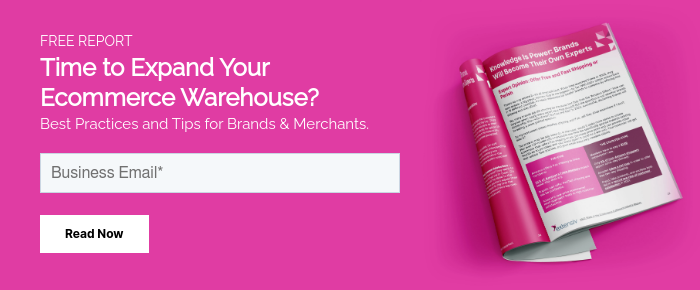Ecommerce has gone through a period of amazing growth over the last decade. According to Forbes, the ecommerce sector, including fulfillment centers, has created 355,000 new jobs since 2007. That growth far exceeds the 51,000 jobs lost since 2007 in the "general retail" sector, which includes the brick-and-mortar retailers competing most directly with ecommerce.
Given all the growth in the industry, ecommerce businesses face competition to attract and retain workers. As we know, not all talent is created equal. But how can you get the best employees to join your staff?
When you talk to employees, you'll quickly find that perks and benefits are some of the key motivating factors for them, and therefore powerful tools you can use to keep your team happy and hardworking.
Perks and benefits can prove vital in employee recruitment and retention. A study by the U.S. Chamber of Commerce Foundation reports, “More than half of millennials (56%) agreed that a quality benefits package influences their choice of employers, and 63% say that benefits are an important reason in staying with an employer.”
What are Perks & Benefits?

First of all, it’s important to point out that perks and benefits are not the same.
Benefits are generally defined as non-wage compensation that supplements salary. This definition includes offerings such as health insurance and retirement plans. Benefits focus more on employees' needs than on their wants. Employees may not think about their benefits on a daily basis, but when they have health problems or face a crisis, benefits become essential.
While benefits focus on needs, perks deliver on wants. Perks are non-wage items with the potential to boost employee happiness and daily performance. A perk could be almost anything, from free food in the office to a free vacation as a reward for meeting a specific goal. Perks can also include things like merchandise discounts, a company car, and standing work desks. In short, perks motivate employees, energize them to perform well, and add flavor to their everyday routine.
As an employer, the question you’ll want to answer is whether benefits or perks will be more appealing to your team. The priorities of younger workers may be different from those of older workers. While people with families and dependents may value a competitive benefits package, fun perks may be more appealing to the population under 30, for instance.
According to Social Media Today, younger workers and millennials have a more "social mindset," preferring to work in teams and more accustomed to working with technology. As employees of ecommerce businesses, millennials will also change the future of the industry and help to make it more adaptable to younger audiences.
Benefits that Matter
Exactly how important is it to offer benefits? An Aflac WorkForce Report states, "Employee satisfaction with their benefits influences their loyalty, productivity, and decision to leave a company." According to the report, about 59 percent of workers would consider accepting slightly lower wages if they were offered a new job with a powerful benefits package. Benefits not only play a role in keeping employees, but they can also serve to bring in new talent.
To design an attractive, affordable benefits package, consider offering the following components to your employees:

Health Care Coverage
In 2012, the Monster Insights team conducted a study to discover which benefits are most attractive to employees. The results show that health care accounts for almost one-third of the value that prospective employees would place on a benefits package.
Health care's attractiveness varied between different groups in the study. Lower income workers placed a higher value on health care, while workers who made less than $90,000 a year said health care could make up to 35% of their compensation. Employees with incomes more than $90,000 judged vacation time as more important than health care.
The study also surveyed unemployed job candidates, and they assigned health care a greater value than employed workers.
Think about your own team. How much value might they place on health insurance? You may even consider surveying them to find out.
Vacation Time
The Monster Insights research found that vacation time comes second in importance after health care. However, even though employees like paid time off, they do not always use that time. A Glassdoor survey found that, on average, Americans use only half of their allowed vacation time. Even worse, 61% said they work while on vacation.
Forbes contributor Adam Hartung tells the story of a company with a division where the employees used only about 25% of their allowed time off. The company's executives viewed this statistic as a good thing. However, the division ended up losing about four-fifths of its revenue, and some employees left due to burnout. It’s critical not only to offer vacation time, but also to encourage employees to use their available time off.
Retirement Plans

U.S. News & World Report cites data from the U.S. Bureau of Labor Statistics that show that small businesses spend more than twice as much on health benefits than they do on retirement plans for their employees. Nevertheless, small business owners recognize that offering retirement benefits could prove helpful. According to a Government Accountability Office (GAO) survey, almost 70% of small business owners said that offering a 401(k) would aid them in attracting and retaining employees.
How do employees feel about retirement plans? A Forbes contributor notes, “Employees are far more attentive to what retirement plans are offered through their employers [than they were in the past].” This reality may be because of the plight of current retirees, since 44% of retirees worry about debt.
Tuition Reimbursement
In an article for the Small Business Chronicle, Demand Media's Ruth Mayhew says, "Employee advancement opportunities are central to strong job performance." Offering tuition reimbursement can make employees feel that their employers want them to reach their full potential. Plus, tuition reimbursement also opens up some employer tax breaks.
Perks That Promote Employee Happiness

A Glassdoor survey found that about one-fifth of employees rank office perks as one of the most important workplace benefits. Below are some examples of tech and retail companies with highly-rated perk programs:
- Google's Glassdoor ratings are through the roof, partly because of the perks the company offers, which include free gourmet food, an innovative culture, 24/7 tech support, and free transportation. Employees can even bring their pets to work. However, taking certain pets to work, like cats, for example, comes with a set of pros and cons.
- Facebook is another Glassdoor star, known for its competitive benefits package and perks. The company's campus has a barbershop, bike repair shop, and great places to eat.
- Amazon, currently on the hunt for its second headquarters, offers top perks like daily catered lunch, happy hours, a free on-site gym, and more.
- Reebok encourages employees to reach their personal fitness goals by providing an on-site gym with Crossfit classes.
- Ikea offers up to four months of paid parental leave to both part-time and full-time employees who have worked there at least a year, regardless of whether they work at a retail store or the corporate headquarters.
These perks range from simple to extravagant, and not all of them are practical for all businesses. Even if your budget does not allow you to give your employees an on-site gym or catered lunch every day, you can still learn from the examples of companies that have the means to offer these perks.
To help you decide where to start when you’re designing your perks package, take a lesson from 400 marketing and advertising executives who participated in a survey, listing some of the top perks they offer to employees. The results reveal that gym memberships, a work-from-anywhere option, and free food are some of the features employees most appreciate.
The Recipe for Happy Employees
It’s clear that employee perks and benefits increase workplace happiness, employee retention, and overall productivity. Yes, perks and benefits represent an expense, but they can really be thought of as an investment. Coupled with a sound sales strategy, perks and benefits will help increase profits and encourage business growth.
If it is not within your means to offer everything employees want, start with the basics — like access to health insurance. When circumstances allow, add other benefits such as vacation time, a retirement plan, and tuition reimbursement. Do not neglect perks, either. Discount vouchers and employee social events contribute to a productive, positive work culture that allows your team to grow and thrive.
Also, check out our guide on hiring criteria for e-commerce employees to make sure you get the best candidates.








